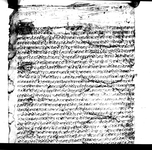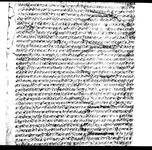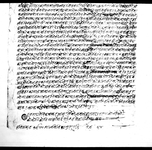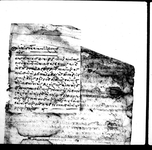A petition from Torcye Bhoṭe demanding actions be taken against Syākapo Bhoṭe and his sons together with a reply from Western Commanding General Candra Śamśera Jaṅga Bahādura Rāṇā (VS 1955)
ID: L_1200_0010
Edited and
translated by Rajendra Shakya
in collaboration with
Yogesh Budathoki
Created: 2020-04-23;
Last modified: 2022-11-30
For the metadata of the document, click here
The accompanying edition, translation/synopsis and/or commentary are available under the terms of the Creative Commons Attribution-ShareAlike 4.0 International License
Abstract
This petition from Torcye Bhoṭe pleads innocence of the charge of theft laid against him and demands actions be taken against Syākapo Bhoṭe and his four sons for physically assaulting him and his father. In reply, the western commanding general instructs three jimmāvālas of the region to look into the matter and report back.Diplomatic edition
[1r]
1श्री\1[?]2[?]गरिप्रवरकरुणानिधान[?]षान्गीमादरियाकोषुवाअठारसैषोलामध्येसामागा
3उवस्न्यास्याक्पोभोटेभंन्येकाघरका[...]५६हराइचोरिभयाकोरहेछरसोहिमुद्दामाछागाउव
4स्न्यानाग्यालजनभंन्येझाक्रिभंन्येलेयेहिगयाका५५सालकाश्रावणमहिनामादिनवारकोभन्यास
5मझनाभयेनयेकदिनदिउसोनिजझाक्रिलेध्यांग्रोवजाइनिजस्याकपोभोटेरनिजकाछोराहरुस्मे
6तलिमेराघरमाआइतिम्रोरुपैञाचोर्नेइनिहुन्∙भनिमलाइविनादसिप्रमाणलेचोरिमापक्रंदामै
7लेलियाकोदेषेकोपनिछैन∙दसिहेरुंल्याउभंदातालचाषोलिदसिहेरुंभंदादसिझिकिदेषाउनन
8सकदा∙निजझाक्रिलेउल्टोमलाइरमेरावावुतांजिनमुइदुप्भोटेलाइस्मेत१||∙लामोघोचाले
9कुटिलातलेहानिसास्तिसासनागर्दा∙मेरोनिधारमाघाउभैरगतपछेगरिदियाकोर∙मेरोरमेरा
10वावुकोज्यूमा२|३ठाउनिलपर्नेस्मेतगरिकुटिफर्किगयाकोथियो∙तेस्काभोलिपल्टनिजस्या[...]
11पोभोटेरनिजकाछोराहरु४ज्माजना५आइमेराघरनेरावाटामामलाइभेटाइतैलेचोरिगरिलियाका[...]
12रुपैञादिंछस्किदिदैनौभनिनिजहरु५जनालेहुलगरिदाउरालेकुटिलातलेहानिकपालकारौउषे[...]
13सास्तिसासनागर्दा∙मेराज्युमाठाउठाउमानिलडामस्मेतपर्याकोथियो∙सोवेहोराहामिहरुकासामागाउको[...]
14ट्टावालमुषिया∙सिथरभोटेजेठावुढाछिरिंतावेभोटेहरुसंगभंनजादा∙नि[?]स्याकपोभोटेरनिजकाछोराज
15ना४स्मेत∙फेरितहिआइनिजमुषियासिथरजेठावुढाछिरिंतांवे२जनालाइर∙मलाइमेरावावुतांजिनमु
16इदुपभोटेलाइस्मेतनिजहरु५जनामिलिहुलदंगागरिदाउराकादाउरालेकुटिलातलेहानि[?]
17सासनाग[...]याकोथियोआफुलेनषायाकोनलियाकोवेहोरामानाग्यालजनझाक्रिलेगर्दा∙मेरोवे
18इजतभैज्युलेपनिसास्तिसासनाषानुपर्योविनादसिलेमलाइचोरिवातलाउनपाउन्याहोइनभनि
19निजझाक्रिवस्याकागाउकोजिम्माव़ालछांम्वाषुनुसंगगैभंनजादानिजझाक्रिलाइडाकनपठाइसोध
20दायोतोर्च्येभोटेलाइचोरिदोसलगायाकोमैलेहोइनचोरपक्रनेविद्यापनिमसंगछैन∙स्याकपोभोटे
21लेयेकदिनमलाइडाकिमेरोमोरु५६चोरिभयाकोछयोरुपैञामातिमिलेध्यांगरोवजाइ∙तोर्च्येभोटे
22कोघरमागैतिम्रोरुपैञाचोर्नेयहिहोमात्रभनिदेउरुपैञामनिकालुंला∙भंदातोर्च्येभोटेकोघरपनि
23मैलेदेषेकोछैनपछिमलाइकेहिजानिकेहिभयोभन्यामैलेवुझाउनुपर्नेछभनिमैलेभंदातिमि
24लाईकेहिभैपरिआयोभन्यामछुधंदामांनुपर्दैन∙तोर्च्येभोटेकोघरनदेषेकोभयामअघिजाउ
25लातिमिध्यांगरोवजाइपछिपछिआउभनिसाह्रैजोरगरिभंदाटार्ननसकिसोवमोजिमगै∙तोर्च्ये
[1r-part2]
26भोटेलाइविनादसिलेमैलेचोरिदोसलगाइनिजलाइनिजकावावुलाइस्मेतलठिलेकुटिसास्ति
27सासनागरिआयाकोसाचोहोअरुकुराकहानिमलाइकेहिपनिथाहाछैनभनि∙निजझाक्रिलेसा
28वितिहुदानिजलाइज्मानिमा∙निजछांम्वाषुनुलेछोडेकोथियोअरुथोककेहिगरेकोथियेन∙
29ताहापछियहिगयाकाकार्तिकमहिनामासोहिसामागाउकामुषियाजेठावुढालामाकटुवालगाउका
30भलाआदमिहामिहरुकावावुछोराहरुस्मेतभैनिजछांम्वाषुनुकाघरमागै∙योहामिहरुकागाउकोस्मे
31तअघिदेषितिमिलेरतिम्रावावुलेजिम्मावालिपट्टाभयाकोहुनालेजोपरिआयाकोकाजकामगरि∙निसा
32फस्मेतगरिदुनिञाहरुकोचितवुझाइआयाकोहो∙जिम्मावालिपनितिमिनैहोसोवमोजिमहामिपनि
33मांदछौ∙हामिहरुकागाउमादुनिञाहरुलेमनपरिगरिवेनिसाफहुनलाग्योत्येछिमिकावुहारिअं
34मजितोकेभोटेसंगपोइलगयाकामुद्दामाअघिकाथितिवमोजिमहामिमुषियाहरुलेगर्याकानिसा
35फवमोजिममोरु२४०विहाषर्चभराइदिदापनिलियेनतोर्च्येभोटेलाइस्याकपोभोटेलेविनादसिले
36चोरिलायाकामुद्दामापनिनिजस्याकपोभोटेलेहामिमुषीयाजेठावुढानिजतोर्च्येकावावुछोराहरु
37लाइस्मेतहुलदंगागरिस्याकपोकावावुछोराहरुमिलिहामिलाईस्मेतकुटिसास्तिसासनागरे∙येसमु
38द्दामास्मेततिमिलेनिसाफहेरिदेउभंनजादानिजछांम्वाषुनुलेतिमिहरुमुषियास्मेतलाइहुलदंगा
39गरिकुटेकामुद्दामामनिसाफगर्नसकदिननिसाफगर्नेतालुकपनिमेरोछैनमेरानाउमापछिसनद
40भैआयोभन्याउसवेलामामैलेवुझेजानेसंम्मअैनवमोजिमहेरिदिउलाभनिजवाफदियाकोथियो
41सोहिवेहोराथाहापाइछांम्वाषुनुकानाउमाजिम्माव़ालिपट्टाभयापछिहामिलेमनपरिगरेकामुद्दामुद्दा
42माडंण्डसजायेहोलान्भंन्याठानिनिजटेंछिमिकामानिसरनिजस्याकपोकामानिसहरुमिलिआइ
43घरद्वारकोठेगानैनभयाकामानिसस्याकपोभंन्याभोटेलाइअघिसारिजिम्मावालि∙सामागाउकोगरि
44लग्योभंन्याकुरासुनिंछनिजस्याकपोभोटेकोघरकाजथाअैलेनैजचाइवक्स्यामोरु५हुनपनिक
45ठिनैछनिजस्याकपोभोटेकाडरलेसोहिगाउमावस्नस्मेतनिसाफनभैडरायाकोहुनालेसोहिगाउ
46कामुषीयाजेठावुढाहरुलेस्मेतकागजलेषिदियाकोहुनालेछा⟪क⟫गाउमावसैसरिवस्नगयाकोछु
47निजस्याकपाभोटेकोरुपैञाचोरिगर्नेमानिसपनि∙दसिप्रमाण∙साछिग्वाहिवाटनिजस्याकपो
48कासाहिलाछोरापक्काहो∙मैलेपनिकायेमगरिदिनसकछु∙लेषियाकावेहोरामा∙मेरोहराउवि
49राउकसुरदसिस्मेतकेहिनभै∙मलाइचोरिकोदोसलगाइनिजस्याकपोरनिजकाछोराहरु४
[1r-part3]
1[Unknown seal]50अरुअैनलेजजसकानाउमावादिलिनुपर्छहुलदंगागरिकुटेकोलातलेषानेकोठाउठाउ
51मानिलपार्नेगरेकोसवैषोलिवादिलिअैनवमोजिमनिसाफगरिछिनिदिनुभंन्या
52हामिहरुकागाउ∙सामागाउकाजिम्माव़ालवाहेकछागाउकाजिम्माव़ालछांम्वाषुनुर
53लोगाउकाजिम्माव़ालनिमादोर्जेकानाउमास्मेतदस्षतगरिपठाइदिनुभंन्यातहसि
54लअडाकाहाकिम्कारिंदाकानाउमाप्रमान्गीगरिवक्स्या∙मगरिवनिर्धालेअैनवमोजि
55महकइन्साफपाउन्याथिञांसर्कारजोमर्जिसिरउपर∙
56इतसदासेवकचाकर∙अठारसैषोलामध्येछाकगाउवस्न्यातोर्च्येभोटे
57कोकोटिकोटिसाष्टांगडंण्डव़तसेव़ासतंसहश्रम¯¯ ¯¯ ¯¯
58इतिसम्वत१९५५सालमितिफागुणसुदि रोज शुभ्म्¯¯ ¯¯ ¯¯
[2r]
1श्री\1[Unknown seal]1श्रीपश्चीमतर्फकाकम्यांडीङ्जनरल2साहेव ¯ ¯ ¯ ¯ ¯ ¯ ¯
3 ¯ ¯ ¯ ¯ ¯ ¯ ¯ ¯ ¯ ¯ ¯ ¯ ¯ ¯ ¯
4यस्माजीम्माव़ालछाम्वांषुनुलोगाऊकाजीम्मा
5व़ालनेमादोर्ज्येजीम्माव़ालकटकवाहादुरकार्कि
6स्मेतभैइनलाईकुट्पीट्गर्न्येसामागाऊका
7मानीसजोजोहुनपक्रीदुवैथरकोअैनकोरीत
8पुर्याईवेहोरावुझीइनलेवीन्तीगरेवमोजीम्
9चोरीवातलायाकोरकुट्पीट्गरेकोसाचोरहे
10छभन्याज्मानवंदीगराईसोज्मानवंदीस्मेतगासी
11रपोट्लेषीतीमीहरुलेस्मेतस्हीछाप⟪गरि⟫हाम्राहजुरमा
12जाहेरगर्नुरसजायगर्नालाईहामी⟪वाट⟫ज्वाफभैआया
13वमोजीम्गर्नुइतिसम्वत१९५५सालमीतीफा
14गुणसुदी११रोज शुभ्म् ¯ ¯ ¯ ¯ ¯ ¯
Translation
[1r-part1]
Likhitam2 : O caretaker of the poor [and] receptacle of compassion! I hereby inform you that 563 mohararupaiyā̃s were lost and [believed to have been] stolen from the residence of a person known as Syākpo Bhoṭe, a resident of Sāmāgāu in the Aṭhāra Sai Kholā region, which is a khuvā registered as your khānagī. And regarding the same criminal case, one afternoon on a day I fail to remember in the month of Śrāvaṇa of this year [VS 19]55 (1898 CE) a person called Nāgyālajana, a resident of Chāgāu who is also known as a jhā̃krī, came to my house beating a drum (ḍhyāṅgro) in the company of the said Syākapo Bhoṭe along with his sons and, [pointing me out], said that this was the man who stole his money. When, being accused of theft without any evidence and without [anyone] having seen me take [the money], [I] asked [them] to show evidence, [which they] failed to produce. Instead, the said jhā̃krī brutalized me and my father Tāṃjina Muidup Bhoṭe by hitting [us] with a 1½ [cubit] long pole and kicking [us], wounding me in the forehead and making me bleed, while leaving me and my father with 2–3 bruises on our bodies, and [then he] went off. The said Syākapo Bhoṭe and his 4 sons—a total of 5 persons—came the next day and found me on a road near my house. They asked [me], "Will you give back the money you stole or not?" They mobbed and brutalized me by beating me with sticks, kicking me and pulling my hair. This left me with many bruises on my body.
When [I] went to report the above-mentioned details to paṭṭāvāla4 mukhiyāSithara Bhoṭe, Chirim Tābe Bhoṭe and other jeṭhā-buḍhās in our Sāmāgāu, the said Syākapo Bhoṭe and his 4 sons again came around and the said 5 persons mobbed and brutalized both mukhiyā Sithara [and] jeṭhā-buḍhāChiriṃ Tāṃbe along with me and my father Tāṃjina Muidupa Bhoṭe by beating us with sticks and kicking [us]. I was humiliated and brutalized all because of the jhā̃krī Nāgyālajana over his statement [regarding money] I had not taken spent.
Feeling that I did not deserve to be accused of theft without any evidence, I went together with Chāṃmbā Khunu, the jimmāvāla of the village where the said jhā̃krī lived, to tell the latter so, and when [we] sent for him and questioned him [about the accusation], he confessed:
"It's not me who laid accusation of theft against this [man] Torcye Bhoṭe. I don't even possess the power (lit. knowledge) to catch a thief. One day Syākapo Bhoṭe summoned me [to his place and said:] '56 mohararupaiyā̃s of mine has been stolen. You go to Torcye Bhoṭe's house beating [your] drum (ḍhyāṅgro) and simply point him out as the person who stole my money. I shall get the money out [of him].' When I told him that I had not seen Torcye Bhoṭe's house, and should anything happen later, I would have to bear the consequences, he pressured me, saying: 'I'm here [for you] should anything happen to you. Don’t worry. If you have not seen Torcye Bhoṭe's house, I'll go ahead and you can follow me beating [your] drum.'
[1r-part2]
It's true that I laid blame for the theft on Torcye Bhoṭe without any evidence and physically btutalized and tortured him and his father, as I couldn't wriggle out of it, and went ahead in accordance with his instructions. I have no knowledge of any other stories [circulating about the matter]."
After his confession, the said Chāṃmbā Khunu released [the jhā̃krī] on bail5 . No other action was taken [against him].
Then afterwards, in the month of Kārtika last year, we, father and son, along with the mukhiyā, jeṭhā-buḍhās, lāmās, kaṭuvālas and bhalādamīs of the aforementioned Sāmāgāu went to the said Chāṃmbā Khunu's house and said:
"As you and your father have long received the jimmāvālīpaṭṭā6 for [the region that includes] our village, you have kept the ryots content by performing all work required to be done and by adjudicating [legal issues]. You are indeed the jimmāvāla. We, too, respect your authority. Our village is heading towards a state of lawlessness, as the ryots are acting arbitrarily. Regarding the case of Amaji7 , Tye Chimi's daughter-in-law, who eloped with Toke Bhoṭe, [the aggrieved party] was provided with 240 in marriage expenses mohararupaiyā̃s in accordance with the settlement handed down by us, the mukhiyā and others, taking our previous customs into consideration. But [he] did not accept [the settlement]. Again, in the case regarding Syākapo Bhoṭe's base-less accusation of theft against Torcye Bhoṭe, the said Syākapo Bhoṭe together with his sons mobbed and brutalized—physically assaulted—us, [namely], the mukhiyā and a jeṭhā-buḍhā and Torcye and his father. Adjudicate on this matter as well."
The said Chāṃmbā Khunu had [then] replied:
"I cannot adjudicate the case regarding the incident of mobbing and brutalizing the mukhiyā and all the rest of you. I do not even have the authority to do so. If later on I receive a sanada in my name [that authorizes me to do so], I shall then look into the matter as far my understanding takes me [and] in accordance with the Ain."
Having come to know about such details and considering the possibility of being punished in the lawsuit relating to [their] arbitrary actions after the jimmāvāla contract had been granted to Chāmmbā Khunu, it is learnt that abettors of the said Ṭeṃ Chimi8 and the said Syākapo Bhoṭe came together to put forward a Bhoṭe [also] named Syākapo, a person whose domicile is not even certain, and got him the authority to act as jimmāvāla of Sāmāgāu9 . If you get the house and property of the said Syākapo Bhoṭe assessed at this very moment, they will hardly be worth even 5 mohararupaiyā̃.
Owing to my fear of the said Syākapo Bhoṭe, and being fearful of living in the said village given the non-delivery of justice, I have [now] migrated to Chākagāu, the mukhiyā and jeṭhā-buḍhās of the said village having also issued [me] a written document10 . On the basis of evidences and witness testimony, it is confirmed that the who stole the said Syākapo Bhoṭe's money is his third son. I, too, can affirm this.11
[1r-part3]
[Unknown seal]
[Therefore] I, a poor and helpless person, would get my rights [restored] and justice delivered in accordance with the Ain if you issued a pramāṅgī in the name of the chief officer (hākima) and clerks (kārindā) of the Tahasila Aḍḍā, instructing them to send out a missive (daskhata)—in the name of the jimmāvāla of our village Sāmāgāu, along with Chāṃmbā Khunu, jimmāvāla of Chāgāu, and Nimā Dorje, jimmāvāla of Logāu—that directs them to investigate everything, draw in [other] plaintiffs, [and] adjudicate, in accordance with the Ain, the case of the said Syākapo Bhoṭe and his 4 sons mobbing, beating, kicking and leaving me ([and] other plaintiffs to be drawn in under the Ain) with multiple bruises upon accusing [me] of theft when there was no impropriety or fault on my part, nor was there any evidence [against me] in the details mentioned [above].
Sarkāra! [I] receive your order (marjī) as [something to be kept] on my head.
From here crores and crores of eight-limbed reverential salutations from [your] always [faithful] servant Torcye Bhoṭe, a resident of Chākagāu in the Aṭhāra Sai Kholā [region]. A hundred thousand acts of worship.
(Day not mentioned), the (date not mentioned) of the bright fortnight of Phāguṇa in the [Vikrama] era year 1955 (1899 CE). Auspiciousness.
[2r]
[Reply to the document:]
Śrī
Venerable Western Commanding General Sāheba12
Regarding this [matter], [you,] jimmāvālaChāmbāṃ Khunu, jimmāvāla of LogāūNimā Dorjye13 [and] jimmāvālaKaṭaka Bāhādura Kārki, shall altogether arrest whoever the persons from Sāmāgāū are who physically assaulted him (the petitioner Torcye Bhoṭe) and record statements from both parties according to procedures prescribed by the Ain, and if it is true that the charges of theft was indeed laid against him and he was assaulted as asserted by him, then [all of] you shall obtain a jabānabandī from him, prepare a report, sign it and deliver it to us enclosing the said jabānabandī. Regarding the punishment, act in accordance with our reply.
(Day not mentioned), the 11th of the bright fortnight of Phāguṇa in the [Vikrama] era year 1955 (1899 CE). Auspiciousness.
Commentary
This document contains a petition by Torcye Bhoṭe and a short reply to it from the western commanding general. The petition appears to be a copy of what was filed at the office of the western commanding general, as it does not contain any seal, nor are the day and date mentioned. The short reply, which does contain a seal, must be the original. No addressee is mentioned in the document, but as the reply comes from the western commanding general, it is evident that this petition was intended for him.




